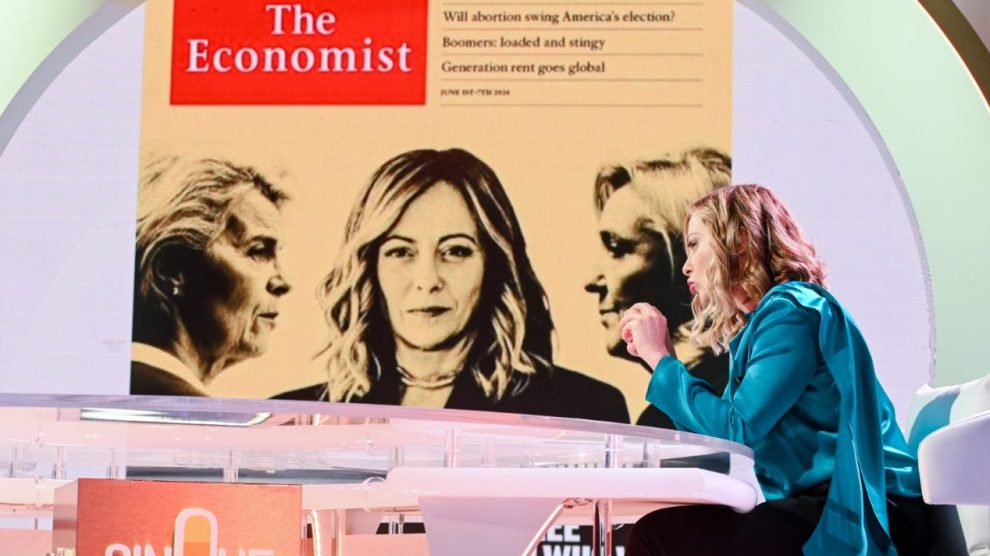The day after… the European elections and a few days before the G7 summit in Puglia, Italian Prime Minister Giorgia Meloni was the only leader of a major EU country to emerge and be strengthened from the vote. Her party, Fratellid’Italia (ECR), won 28.8% of the vote, an increase from 26% in the 2022 general election, which confirms its first place in Italy.
- “Italy is heading to the G7 and the upcoming European negotiations with the strongest government of all, which is both a satisfying and a great responsibility”, commented PM Meloni.
- President Emmanuel Macron called for early elections in France after his party’s disastrous performance. Chancellor Olaf Scholz’s SPD in Germany is the third-largest party after the CDU/CSU and AfD. The United Kingdom will hold a general election on July 4, with Keir Starmer’s Labour Party currently ahead of outgoing Prime Minister Rishi Sunak’s Conservatives in opinion polls.
An overview. Prime Minister Meloni, the top candidate of Fratelli d’Italia, received the most votes in four out of five constituencies. However, as previously announced, she will not take a seat in the European Parliament.
- The elections in Italy can be seen as a preview of a potential referendum on the constitutional reform proposed by the Meloni government. This reform aims to strengthen the role of the Prime Minister.
- The overall voter turnout in Italy was below 50%. For the first time in the history of the Italian Republic, less than half of the eligible voters casted their vote.
The winners. The centre-left Democratic Party (S&D), led by Elly Schlein, scored positively, confirming its second place in Italy with 24% of the vote, up from 19% in the 2022 general election.
- Forza Italia (EPP), competing for the first time without its founder, Silvio Berlusconi, also performed well. The party, led by Antonio Tajani, Deputy Prime Minister and Minister for Foreign Affairs, won 9.6% of the vote (up from 8.1% two years ago).
- Alleanza Verdi e Sinistra (Greens/EFA) also performed well, with 6.7% of the vote, up from 3.6% in 2022.
- On the other hand, the centrist parties’ results were disappointing (Renew): neither the Stati Uniti d’Europa of former Prime Minister Matteo Renzi nor the Azione of Carlo Calenda, which had tried to present themselves with a common list, passed the 4% threshold.
The losers. The parties that made “pacifism” their slogan and accused some European leaders, such as French President Emmanuel Macron and NATO, of leading Europe into “World War III” by supporting Ukraine performed poorly.
- The 5 Star Movement (NI), led by former prime minister Giuseppe Conte, won 9.9% of the vote, just over five percentage points less than in the 2022 elections.
- The League (ID), led by Deputy Prime Minister and Transport Minister Matteo Salvini, saw a slight gain, from 8.8% to 9%. However, Forza Italia’s overtaking may cause tension within the government majority and the League itself.
- The founder of the League, Umberto Bossi, declared that he had voted for Forza Italia, breaking with the ultra-right line adopted by the party under Salvini and represented by General Roberto Vannacci, a former military attaché in Moscow, who was the party’s most popular candidate (and was elected).
- Salvini hoped that the government majority, made up of the Fratelli d’Italia, the League and Forza Italia, ‘will not split in Brussels’. He also criticised ‘the damage done’ by the European Commission chaired by EPP candidate Ursula von der Leyen. I do not want another five years of von der Leyen, which would not lead to anything good,” he added.
Is bipolarism back? Commenting on the results, Prime Minister Meloni said that Italy’s political system “is becoming bipolar again”.
- She added that this is “good news because there are opposing visions, and citizens are being asked which side they are on”.
- However, it should be noted that there are differences between the national and European elections and the opposition parties are finding it difficult to unite and form a clear bloc that can compete with the government coalition.





